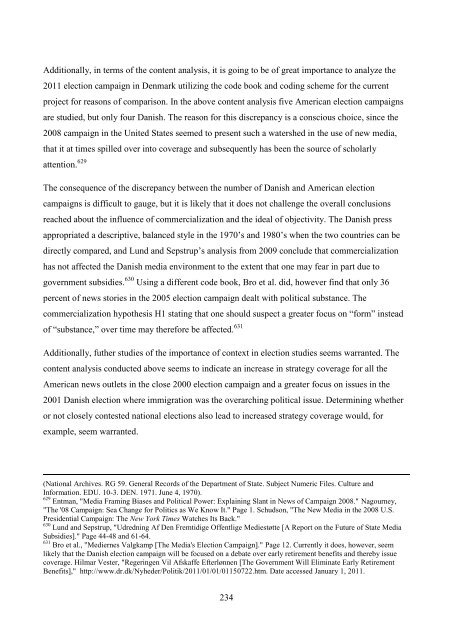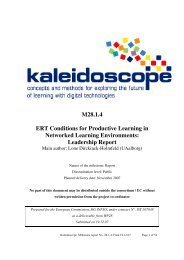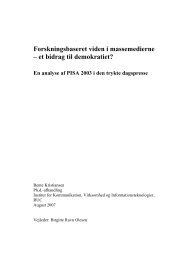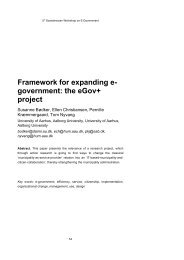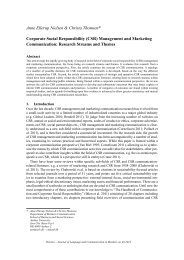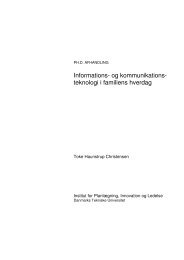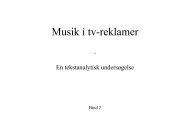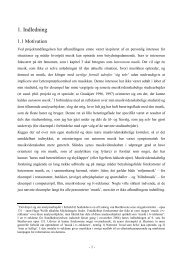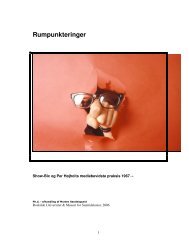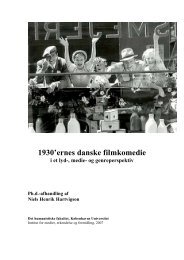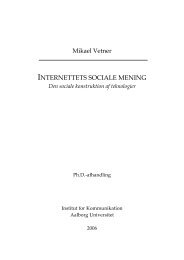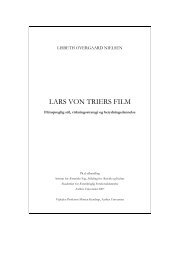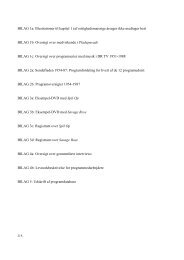The Jeremiad Over Journalism
The Jeremiad Over Journalism
The Jeremiad Over Journalism
You also want an ePaper? Increase the reach of your titles
YUMPU automatically turns print PDFs into web optimized ePapers that Google loves.
Additionally, in terms of the content analysis, it is going to be of great importance to analyze the<br />
2011 election campaign in Denmark utilizing the code book and coding scheme for the current<br />
project for reasons of comparison. In the above content analysis five American election campaigns<br />
are studied, but only four Danish. <strong>The</strong> reason for this discrepancy is a conscious choice, since the<br />
2008 campaign in the United States seemed to present such a watershed in the use of new media,<br />
that it at times spilled over into coverage and subsequently has been the source of scholarly<br />
attention. 629<br />
<strong>The</strong> consequence of the discrepancy between the number of Danish and American election<br />
campaigns is difficult to gauge, but it is likely that it does not challenge the overall conclusions<br />
reached about the influence of commercialization and the ideal of objectivity. <strong>The</strong> Danish press<br />
appropriated a descriptive, balanced style in the 1970‘s and 1980‘s when the two countries can be<br />
directly compared, and Lund and Sepstrup‘s analysis from 2009 conclude that commercialization<br />
has not affected the Danish media environment to the extent that one may fear in part due to<br />
government subsidies. 630 Using a different code book, Bro et al. did, however find that only 36<br />
percent of news stories in the 2005 election campaign dealt with political substance. <strong>The</strong><br />
commercialization hypothesis H1 stating that one should suspect a greater focus on ―form‖ instead<br />
of ―substance,‖ over time may therefore be affected. 631<br />
Additionally, futher studies of the importance of context in election studies seems warranted. <strong>The</strong><br />
content analysis conducted above seems to indicate an increase in strategy coverage for all the<br />
American news outlets in the close 2000 election campaign and a greater focus on issues in the<br />
2001 Danish election where immigration was the overarching political issue. Determining whether<br />
or not closely contested national elections also lead to increased strategy coverage would, for<br />
example, seem warranted.<br />
(National Archives. RG 59. General Records of the Department of State. Subject Numeric Files. Culture and<br />
Information. EDU. 10-3. DEN. 1971. June 4, 1970).<br />
629<br />
Entman, "Media Framing Biases and Political Power: Explaining Slant in News of Campaign 2008." Nagourney,<br />
"<strong>The</strong> '08 Campaign: Sea Change for Politics as We Know It." Page 1. Schudson, "<strong>The</strong> New Media in the 2008 U.S.<br />
Presidential Campaign: <strong>The</strong> New York Times Watches Its Back."<br />
630<br />
Lund and Sepstrup, "Udredning Af Den Fremtidige Offentlige Mediestøtte [A Report on the Future of State Media<br />
Subsidies]." Page 44-48 and 61-64.<br />
631<br />
Bro et al., "Mediernes Valgkamp [<strong>The</strong> Media's Election Campaign]." Page 12. Currently it does, however, seem<br />
likely that the Danish election campaign will be focused on a debate over early retirement benefits and thereby issue<br />
coverage. Hilmar Vester, "Regeringen Vil Afskaffe Efterlønnen [<strong>The</strong> Government Will Eliminate Early Retirement<br />
Benefits]," http://www.dr.dk/Nyheder/Politik/2011/01/01/01150722.htm. Date accessed January 1, 2011.<br />
234


